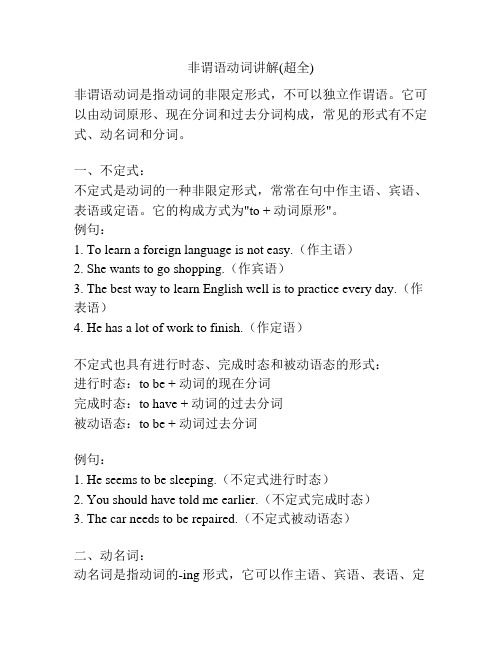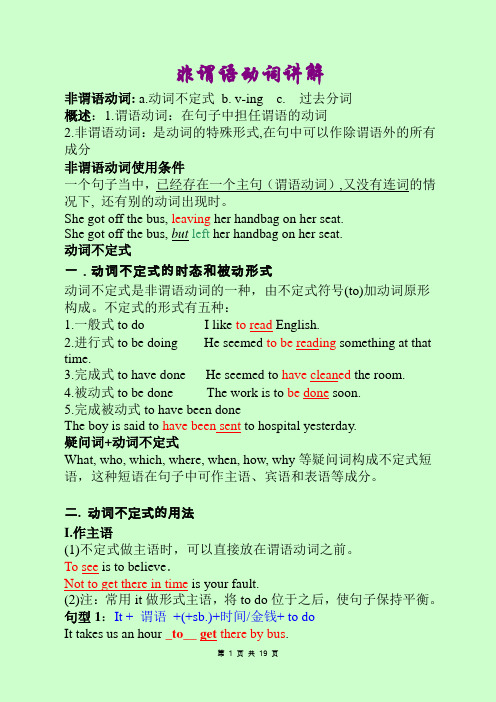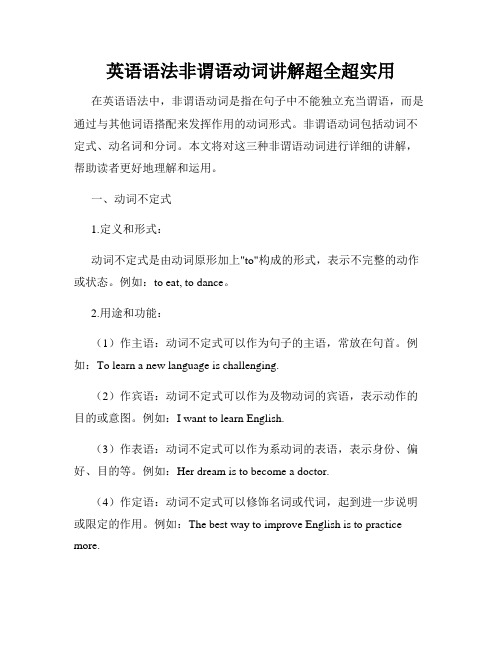非谓语动词全面讲解
超详细非谓语动词讲解

超详细非谓语动词讲解非谓语动词是指在句中充当动词的成分,但不具备谓语的功能,主要有动词不定式、动名词和分词三种形式。
非谓语动词可以用于句法结构、修饰成分、语态和时态等方面的变化。
下面我将分别介绍这三种形式的非谓语动词。
一、动词不定式:动词不定式是由"to + 动词原形"构成的,可以用作动词、名词、形容词和副词的成分。
动词不定式的形式有时态和语态的变化。
1. 作为动词的补充:动词不定式可以作为及物动词的宾语或介词的宾语。
例句:- I want to go to the park.(作为动词want的宾语)- She agreed to help us.(作为介词to的宾语)2. 作为名词的补充:动词不定式可以作为句子成分的一部分,并起到名词的作用。
例句:- To study is important for children.(作为主语)- My goal is to become a doctor.(作为表语)3. 作为形容词的补充:动词不定式可以修饰名词或代词。
例句:- I have a book to read.(修饰名词book)- She needs someone to help her.(修饰代词someone)4. 作为副词的补充:动词不定式可以修饰动词、形容词或副词。
例句:- He came here to visit his parents.(修饰动词came)- The coffee is too hot to drink.(修饰形容词hot)二、动名词:动名词是由动词的现在分词形式构成的名词,具有名词的特点,可以作为主语、宾语、表语、定语和同位语等。
1. 作为主语:动名词可以作为句子的主语。
例句:- Dancing is her favorite hobby.2. 作为宾语:动名词可以作为及物动词的宾语。
例句:- He enjoys swimming in the sea.3. 作为表语:动名词可以作为系动词的表语。
非谓语动词讲解(超全)

非谓语动词讲解(超全)非谓语动词是指动词的非限定形式,不可以独立作谓语。
它可以由动词原形、现在分词和过去分词构成,常见的形式有不定式、动名词和分词。
一、不定式:不定式是动词的一种非限定形式,常常在句中作主语、宾语、表语或定语。
它的构成方式为"to + 动词原形"。
例句:1. To learn a foreign language is not easy.(作主语)2. She wants to go shopping.(作宾语)3. The best way to learn English well is to practice every day.(作表语)4. He has a lot of work to finish.(作定语)不定式也具有进行时态、完成时态和被动语态的形式:进行时态:to be + 动词的现在分词完成时态:to have + 动词的过去分词被动语态:to be + 动词过去分词例句:1. He seems to be sleeping.(不定式进行时态)2. You should have told me earlier.(不定式完成时态)3. The car needs to be repaired.(不定式被动语态)二、动名词:动名词是指动词的-ing形式,它可以作主语、宾语、表语、定语或状语。
在句中的位置和用法与名词相似。
例句:1. Reading is my favorite hobby.(作主语)2. I enjoy swimming in the summer.(作宾语)3. Her dream is becoming a famous singer.(作表语)4. The girl standing over there is my sister.(作定语)5. He went to the party without saying goodbye.(作状语)动名词与不定式的区别在于动名词具有进行时态和被动语态,而不定式没有。
非谓语动词讲解(超全超实用)

非谓语动词讲解非谓语动词: a.动词不定式 b. v-ing c. 过去分词概述:1.谓语动词:在句子中担任谓语的动词2.非谓语动词:是动词的特殊形式,在句中可以作除谓语外的所有成分非谓语动词使用条件一个句子当中,已经存在一个主句(谓语动词),又没有连词的情况下, 还有别的动词出现时。
She got off the bus, leaving her handbag on her seat.She got off the bus, but left her handbag on her seat.动词不定式一.动词不定式的时态和被动形式动词不定式是非谓语动词的一种,由不定式符号(to)加动词原形构成。
不定式的形式有五种:1.一般式to do I like to read English.2.进行式to be doing He seemed to be reading something at that time.3.完成式to have done He seemed to have cleaned the room.4.被动式to be done The work is to be done soon.5.完成被动式to have been doneThe boy is said to have been sent to hospital yesterday.疑问词+动词不定式What, who, which, where, when, how, why等疑问词构成不定式短语,这种短语在句子中可作主语、宾语和表语等成分。
二. 动词不定式的用法I.作主语(1)不定式做主语时,可以直接放在谓语动词之前。
To see is to believe.Not to get there in time is your fault.(2)注:常用it做形式主语,将to do位于之后,使句子保持平衡。
句型1:It + 谓语+(+sb.)+时间/金钱+ to doIt takes us an hour _to__ get there by bus.It costs you only $ 100 a month to cook at home.It seemed impossible to save money.句型2:I t’s + n. (+ for sb) + to doIt’s our duty _to_ help the poor.It is a great enjoyment _to_ spend our holiday in the countryside..It is a great honor for us to be present at your birthday party.句型3:It is + adj (+ for sb)to do sth(是形容事物的性质的)It is + adj (+ of sb)to do sth(是形容人的品质的)It is easy for me to finish this work before ten.It is very kind of you to give me some help.It's impolite of you to speak to the teacher like that.疑问词+不定式作主语When to start remains undecided.1.It is easy to get there by bus or taxi.2. It takes about 3 hours to see all the birds.3. It is also impolite to speak with your mouth full when you are eating.4. It’s our duty to take good care of the old.5. How long did it take you to finish the work?6. It is stupid of you to write down everything the teacher says.7. When to start has not been decided.8. It seemed selfish of him not to give them anything.9. It’s necessary for you to lock the car when you do not use it.10. It is useful for our health to do morning exercises.II.作宾语接不定式做宾语I want to know this matter.I don’t expect to meet you here(1)常见动词有:like, demand, expect, promise, begin, determine, refuse, fail, manage, learn, seem, forget, want, prepare, pretend, plan, wish等They want to get_( get ) on the bus, didn’t they?He said he wished __to be ( be ) a professor.(2)it作形式宾语I find/feel to work with him interesting .I find/feel it interesting to work with him.Subject+ find/think/feel/make/ consider… it+adj/n + to do sth.1.We thought _it__ better __to_ start early.2.Do you consider _it__ better not _to_ go?3. I feel _it_ my duty _to_ change all that.4.We think it __ important _ to _ obey the law.5.I know _ it _ impossible _ to _ finish so much homework in a day.(3)疑问词+不定式作宾语常常放在这些动词的后面作宾语:tell, advise, show, teach, find out, decide, discuss, learn, explain…He taught us how to use the tool.No one could tell me where to get the book.The dictionary didn’t tell the Frenchman how to pronounce the word.(4) 作介词but, except, besides的宾语。
英语语法非谓语动词讲解超全超实用

英语语法非谓语动词讲解超全超实用在英语语法中,非谓语动词是指在句子中不能独立充当谓语,而是通过与其他词语搭配来发挥作用的动词形式。
非谓语动词包括动词不定式、动名词和分词。
本文将对这三种非谓语动词进行详细的讲解,帮助读者更好地理解和运用。
一、动词不定式1.定义和形式:动词不定式是由动词原形加上"to"构成的形式,表示不完整的动作或状态。
例如:to eat, to dance。
2.用途和功能:(1)作主语:动词不定式可以作为句子的主语,常放在句首。
例如:To learn a new language is challenging.(2)作宾语:动词不定式可以作为及物动词的宾语,表示动作的目的或意图。
例如:I want to learn English.(3)作表语:动词不定式可以作为系动词的表语,表示身份、偏好、目的等。
例如:Her dream is to become a doctor.(4)作定语:动词不定式可以修饰名词或代词,起到进一步说明或限定的作用。
例如:The best way to improve English is to practice more.(5)作状语:动词不定式可以表示时间、目的、方式等状语的作用。
例如:I went to the park to relax.3.特殊用法:(1)省略to:在某些情况下,不定式的to可以省略,例如在助动词let、make、help等后面。
例如:Let me go.(2)动词不定式的时态:动词不定式没有人称和数的变化,但可以根据不同的时间来使用不同的时态。
例如:I want to go shopping.(现在时态)I wanted to go shopping.(过去时态)二、动名词1.定义和形式:动名词是由动词加上-ing构成的形式,可以作为名词使用。
例如:swimming, running。
2.用途和功能:(1)作主语:动名词可以作为句子的主语,常放在句首。
非谓语动词超详细讲解ppt课件

动名词既有普通形式,也有完成形式和被动形式。完成形式表示动作已经完成, 如having read;被动形式表示动作被承受,如being written。
动名词在句子中的成分
动名词也可以作表语,用来描述 主语的内容或性质,如Her job is teaching English.
动名词还可以作定语,修饰名词, 如a reading room, a swimming pool等。
非谓语动词超详用法与功能 • 动名词的用法与功能 • 分词的用法与功能 • 独立主格结构的用法与功能 • 非谓语动词的注意事项与误区
01
非谓语动词概述
Chapter
定义与作用
定义
非谓语动词是指在句子中不充当谓 语的动词,包括不定式、动名词和 分词三种形式。
独立主格结构的时态和语态
时态
独立主格结构的时态主要根据句子中的谓语动词来确定。如果谓语动词是现在时或将来 时,独立主格结构用现在分词;如果谓语动词是过去时,独立主格结构用过去分词。
语态
独立主格结构的语态分为主动语态和被动语态。当独立主格结构的逻辑主语与非谓语动 词之间是主动关系时,用主动语态;当逻辑主语与非谓语动词之间是被动关系时,用被 动语态。例如:“The problem being settled, we all felt relieved.”(问题解决了,
我们都感到松了一口气。)
06
非谓语动词的注意事项与误区
Chapter
非谓语动词使用时需要注意的问题
动词不定式、动名词和分词的区别
01
在使用非谓语动词时,需要根据语境和表达的逻辑关系选择适
当的非谓语动词形式。
时态和语态的正确使用
02
(完整版)高中英语非谓语动词详解

第二讲非谓语动词教学重点1,非谓语动词和谓语动词的区别;2,非谓语动词的各种形式和应用;3,非谓语动词的考点解析。
一、非谓语动词与非谓语动词的区别1.谓语动词在句中可单独作谓语,而非谓语动词不能单独作谓语。
如:Miss Mary teaches us English . 玛丽教我们英语。
(teaches是谓语动词。
)Mr Victor came to our classroom to have a talk with us last week.维克托先生上周末来到了我们教室和我们谈话。
(to have a talk不定式作状语)2.谓语动词受主语的人称和数的限制,而非谓语动词形式没有这种限制。
如:Tom likes the pop music. 汤姆喜欢流行音乐。
(动词用第三人称单数形式)Tom has nothing to do today. 汤姆今天没有什么事要做。
(do用原形)二、非谓语动词的各种形式和应用非谓语动词主要包括不定式、动名词和分词。
其动能和形式如下:非谓语动词在句中所做的成分如下:三、考点解析非谓语动词一直是高考中的热点。
解答非谓语动词的题目时,一定要解析句子结构,确定所设空是谓语动词还是非谓语动词,以及非谓语动词在句子中充当的功能(如状语、定语或宾补);找准相关动词的逻辑主语,确定该动词与逻辑主语是什么关系(主动还是被动);搜索句子中相关的时间信息,确定非谓语动词的恰当形式。
1 动名词和不定式作表语①如果表语是不定式,主语也是不定式;表语是动名词,主语也是动名词。
如:To see is to believe.=Seeing is believing.②动名词作主语的句型。
如:It is no use/no good/useless doing sth.It is a waste of time doing(也可用It is a waste of time to do)③动词不定式和动名词的复合结构:动词不定式的复合结构有两种:It is difficult/easy/possible/necessary/...for sb. to do sth.和It is kind/wise/foolish/considerate/...of sb. to do。
(完整word版)非谓语动词讲解
非谓语动词【知识要点】定义:在英语中,不作句子谓语,而具有除谓语外其他语法功能的动词,叫做非谓语动词。
分类:非谓语动词有动词不定式(the Infinitive);动名词(the Gerund);现在分词(the Present Participle);过去分词(the Past Participle)。
无论它们在句中作什么成分,他们都保持着自己本身的属性特点。
动词不定式:表将来、具体某一次,常在句中可以作: 主语,宾语,定语,状语,补语,表语;动名词:具有名词功能,常在句中可以作:主语,宾语,表语;作定语时表功能;现在分词:表主动和正在进行, 常在句中可以作: 定语,状语,表语,宾补;过去分词:表被动和已完成,常在句中可以作: 定语,状语,补语。
一、动词不定式不定式由“to+动词原形”构成,其否定形式是“not to+动词原形”。
不定式可以带宾语或状语构成不定式短语,没有人称和数的变化,但有时态和语态的变化。
不定式可作主语、宾语、状语、表语、定语和补语,但不能单独作谓语。
2. 不定式的句法功能1)作主语:To finish the work in ten minutes is very hard.在十分钟内完成这项工作很难。
动词不定式短语作主语时,常用it作形式主语,例如上面一句可用如下形式:It is very hard to finish the work in ten minutes.2)作表语:Her job is to clean the hall.她的工作就是打扫大厅。
3)作宾语:V.+ to do sth.常与不定式作宾语连用的动词有:want, hope, wish, offer, fail, plan, learn, pretend, refuse, manage, help, agree, promise, prefer,afford,ask,decide,expect,intend,等。
高中英语语法非谓语动词详解
高中英语语法非谓语动词详解高中英语语法非谓语动词详解在高级英语语法中,非谓语动词是非常重要的一部分,也是理解和掌握英语语法的关键。
非谓语动词在句子中扮演着重要的角色,可以表达不同的意思和功能。
本文将详细解释非谓语动词的定义、类型和用法,并通过实例进行分析和解释。
一、定义和类型非谓语动词指的是在句子中不作为主要动词的动词形式,它们可以表达动词本身的含义,但没有主语和谓语动词。
非谓语动词包括动词不定式、动名词和分词三种类型。
1、动词不定式:动词不定式是以“to+”动词原形构成的,表示动词的不同形式,如“to do”、“to being”、“to have done”等。
2、动名词:动名词是在动词后加上“-ing”构成的,表示动词的现在分词形式,如“playing”、“swimming”、“jumping”等。
3、分词:分词是动词的过去分词形式,分为现在分词和过去分词两种。
现在分词表示动词的动作正在进行,如“running”、“singing”、“dancing”等;过去分词表示动词的动作已经完成,如“finished”、“eaten”、“read”等。
二、非谓语动词的用法非谓语动词在句子中可以扮演不同的成分,如主语、宾语、状语等。
下面我们通过具体的例子来分析非谓语动词的用法:1、动词不定式:在句子中,动词不定式可以作为主语、宾语和状语等。
例如,“To learn English is important”(学习英语很重要)中,动词不定式“to learn English”作为主语;或者在“I want to go home”(我想回家)中,动词不定式“to go home”作为宾语。
2、动名词:在句子中,动名词可以作为主语、宾语和状语等。
例如,“Playing sports is fun”(做运动很有趣)中,动名词“Playing sports”作为主语;或者在“I enjoy listening to music”(我喜欢听音乐)中,动名词“listening to music”作为宾语。
非谓语动词讲解(超全
非谓语动词讲解(超全非谓语动词是指动词的非谓语形式,包括动词不定式、动名词和现在分词。
与主谓结构不同,非谓语动词可在句子中作状语、定语或表语。
在英语中,非谓语动词的形式是相对固定的,但在不同的语法环境中所表示的意义和用法有所差异。
1. 动词不定式(to-infinitive)动词不定式由“to + 动词原形”构成,常常用作动词的宾语、主语、状语或定语。
例如:- 宾语:I want to go to the zoo.(我想去动物园。
)- 主语:To speak English fluently is important for your career.(流利地说英语对你的事业很重要。
)- 状语:He went to the store to buy some groceries.(他去商店买了些杂货。
)- 定语:She needs a pen to write her essay.(她需要一支笔来写作文。
)2. 动名词(gerund)动名词是将动词加上-ing构成,常常用作动词的宾语、主语、状语或定语。
例如:- 宾语:I enjoy reading books in my spare time.(我闲暇时喜欢读书。
)- 主语:Swimming is good exercise.(游泳是很好的锻炼。
)- 状语:She left the party early, feeling tired.(她因为感觉累了,所以提前离开了聚会。
)- 定语:The crying baby woke up the whole neighborhood.(哭闹的婴儿把整个邻居都吵醒了。
)3. 现在分词(present participle)现在分词由动词原形加上-ing构成,常常用作动词的宾语、主语、状语或定语。
例如:- 宾语:He enjoys playing soccer on weekends.(他喜欢周末踢足球。
)- 主语:Listening to music helps me relax.(听音乐帮助我放松。
非谓语动词讲解史上最全
非谓语动词讲解史上最全非谓语动词是英语中的一种特殊动词形式,它们在句子中通常不具备时态和人称的变化。
非谓语动词包括不定式、动名词和现在分词。
一、不定式(Infinitive)不定式由to加动词原形构成,具有动词和名词的双重特征。
不定式在句子中可以作主语、宾语、表语、定语、状语等成分。
1. 作主语:To learn a foreign language is beneficial to your career.学习一门外语对你的事业有益。
2. 作宾语:I want to visit my grandparents this weekend.我想这周末去看望我的祖父母。
3. 作表语:His dream is to become a famous writer.他的梦想是成为一名著名的作家。
4. 作定语:She has many books to read.她有很多书要读。
5. 作状语:He came to help us.他来帮助我们。
二、动名词(Gerund)动名词由动词原形加-ing构成,具有动词和名词的双重特征。
动名词在句子中可以充当主语、宾语、表语、定语、状语等成分。
1. 作主语:Swimming is my favorite sport.游泳是我最喜欢的运动。
2. 作宾语:I enjoy reading novels in my free time.我喜欢在空闲时间读小说。
3. 作表语:Her hobby is singing.她的爱好是唱歌。
4. 作定语:The running water is clear.流动的水很清澈。
5. 作状语:She went shopping after finishing her homework.她在完成作业后去购物。
三、现在分词(Present Participle)现在分词由动词原形加-ing构成,具有动词和形容词的双重特征。
现在分词在句子中可以充当定语、表语、状语等成分。
- 1、下载文档前请自行甄别文档内容的完整性,平台不提供额外的编辑、内容补充、找答案等附加服务。
- 2、"仅部分预览"的文档,不可在线预览部分如存在完整性等问题,可反馈申请退款(可完整预览的文档不适用该条件!)。
- 3、如文档侵犯您的权益,请联系客服反馈,我们会尽快为您处理(人工客服工作时间:9:00-18:30)。
非謂语动词(一)一、Done被动性:过去分词的逻辑主语是分词动作的承受者(receiver), 而不是发出者,两者构成被动语态或被动意义。
完成性:与句中另一个动作、另一个时间或句子产生的时间相比,分词的动作已经发生、完成。
句法功能表语:许多动词通过+ed 变成形容词,其本质是过去分词用作形容词The boys were astonished.The door remained locked.They seemed worried.定语:划出下列句子的定语部分The broken glass is still lying on the table.The frightened girl was trembling when the police arrived.A grown boy is a boy who has physically and mentally grown up.He sent them his newly-invented devices.She was reading a novel written by Dickens.The people trapped in the big fire were rescued by the firefighters with a helicopter.The radio bought in your shop doesn't work well.翻译:他是被经理测试的人员当中最优秀的员工之一。
宾补1、在感官/ 感知动词后:see, look at, observe, hear, listen to, think, find, imagine, feel, watch等。
We found him greatly changed.2、在使役动词后:make, have, get, keep, leave等。
He made himself understood in spoken English.3、在意愿动词后:like, need, want, wish等。
She came into the shop with a package saying: I needn’t it changed but re-wrapped.翻译:我回到家,发现家里被偷了状语方式和伴随情况The teacher went out, followed by some pupils.The old man sat on the chair, lost in thought.翻译:带着枪和刀,三个大男人冲出了那房子。
条件Heated to a high temperature, water changes into vapor.如果用白色粉刷, the house will appear nicer.原因和理由Done in a hurry, Tom's exercise was full of mistakes.Wounded badly, he was sent to hospital.由于在在旅途后很疲惫, they went to bed early.时间Dismissed by the boss of the hotel, John never got a job.Questioned by the police, the man was very much afraid.让步Badly wounded in the leg, the soldier refused to withdraw.Protected by 3 fences, Robinson Crusoe still felt unsafe.非被动意义的done非谓结构Be faced with;Be lostBe determined toBe armed with巩固练习(一):用上非谓语动词结构完成句子1.那个受伤的男人被送去了医院without delay.2.由于匆匆忙忙地完成,, Tom'shomework was full of mistakes and errors.3.我将会把我的房子重新粉刷。
4.今天下午修的那辆车belongs to one of my friends.5.An old man was collecting 院子里的落叶6.The police were 寻找那个逃跑的男人。
7.他试着让自己英语口语被别人明白。
8.He works and lives in 被绿树围饶着的学校。
9.他感觉自己被抬进一辆车里。
10.It's very important for you tokeep .让你父母得知你的状况。
(inform)参考答案:(一)The injured man was sent to hospitalDone in a hurryI'll have my house repainted.The car repaired this afternoonthe fallen leaves in the yard.searching for the escaped man.He tried to make his broken English understood.a school surrounded by green trees.He felt himself carried into a carriage.your parents informed of your situation.二、Doing动名词及现在分词的意义:表示动作正在进行、强调动作的过程,或者主动1.作主语:可用it 作形式主语Talking is easier than doing.Learning English well is not an easy work.用it 作形式主语:It is no use crying over spilt (溢出来的) milk.句型:it is no use / good doing sth.2.作表语,现在分词作表语(相当于+ing 变成形容词)动名词:对主语说明、解释。
The story is touching. (感人的)His hobby is collecting stamps.3.作宾语你介意把音乐声调低一点吗?I always practice speaking English in the morning.用动名词作宾语的部分动词:Enjoy,be busy doing,imagine,can’t help doing, finishPractice, avoid, miss, keep (on), mind, be worth doing, consider,prevent sb from, quit, devote…to doing翻译:自从被女朋友严重警告之后,他停止了吸烟。
4.现在分词作宾补(动作正在进行或强调过程)我感觉到火车正慢慢停下来。
I see him passing my house every day.5.作定语:修饰一个名词或者代词,可以前置或后置I saw a weeping(哭泣的)girl on my way home.后置: 修饰something, nothing nobody或those, 较长的定语The boy playing the violin over there will take part in a violin competition(比赛).改成定语从句:There is nothing interesting in his story.6.作状语:(伴随,原因等)Following Tom, we started to climb the mountain.Taking a key out of his pocket, he opened the door.Not receiving any letter from him, I gave him a call.翻译:从山顶上望下去,我们可以欣赏到城里极美的风景。
非谓语动词(二)一、分词的特殊时态和语态变化主动被动一般doing being done完成having done having been doneHaving done: 非谓语动作发生在谓语动作之前The secretary worked late into the night, _ __ (prepare)a long speech for her boss.He was praised for (finish)the work ahead of time.Having heard that Bob had got promoted, his friends came to congratulate him.Being done:被动动作放在介词后面;强调动作正在进行,We must do something to prevent water from (pollute)(surround) by the students, the teacher was answering questions one by one.Having been done: having done & being done 的结合Having been told many times, he finally understood it.用上述所学知识写三个句子:巩固练习一:1.Who are these people with banners(横幅)? -A group _____ (call)itself the league(联盟)for Peace.2.To their great fear, they found themselves ________ (catch)in the heaviest snowfall they had ever had.3.Everyone in our class was working hard and doing what we could __________ (enter) a good college.4.It rained heavily in the south,(cause )serious flooding in several provinces.5. A great number of students (question) said they were forced to practise the piano.6.________ (see)from the top of the tower, the south foot of the mountain isa sea of trees .7.I'm calling to enquire(咨询) about the position ___ (advertise )in yesterday's China Daily.8.Though___________(surprise)to see us, the professor gave us a warm welcome.9.While shopping, people sometimes can't help _____ (persuade)into buying something they don't really need.10.Tony was very unhappy for _____ (invite)to the party.11.He ran as fast as he could ____________ (hope) to catch the early bus.12.He spent every minute he could ___________(practise)spoken English.13.Before going abroad he devoted all he could __________(improve)his oral English.14.Not only should you get used _________ ( work) under difficult conditions but you also you pay more attention _________ your work well.二、to do 不定式:主动、表示目的以及将要的动作作主语:1、按时到达那对我们来说是不可能的。
